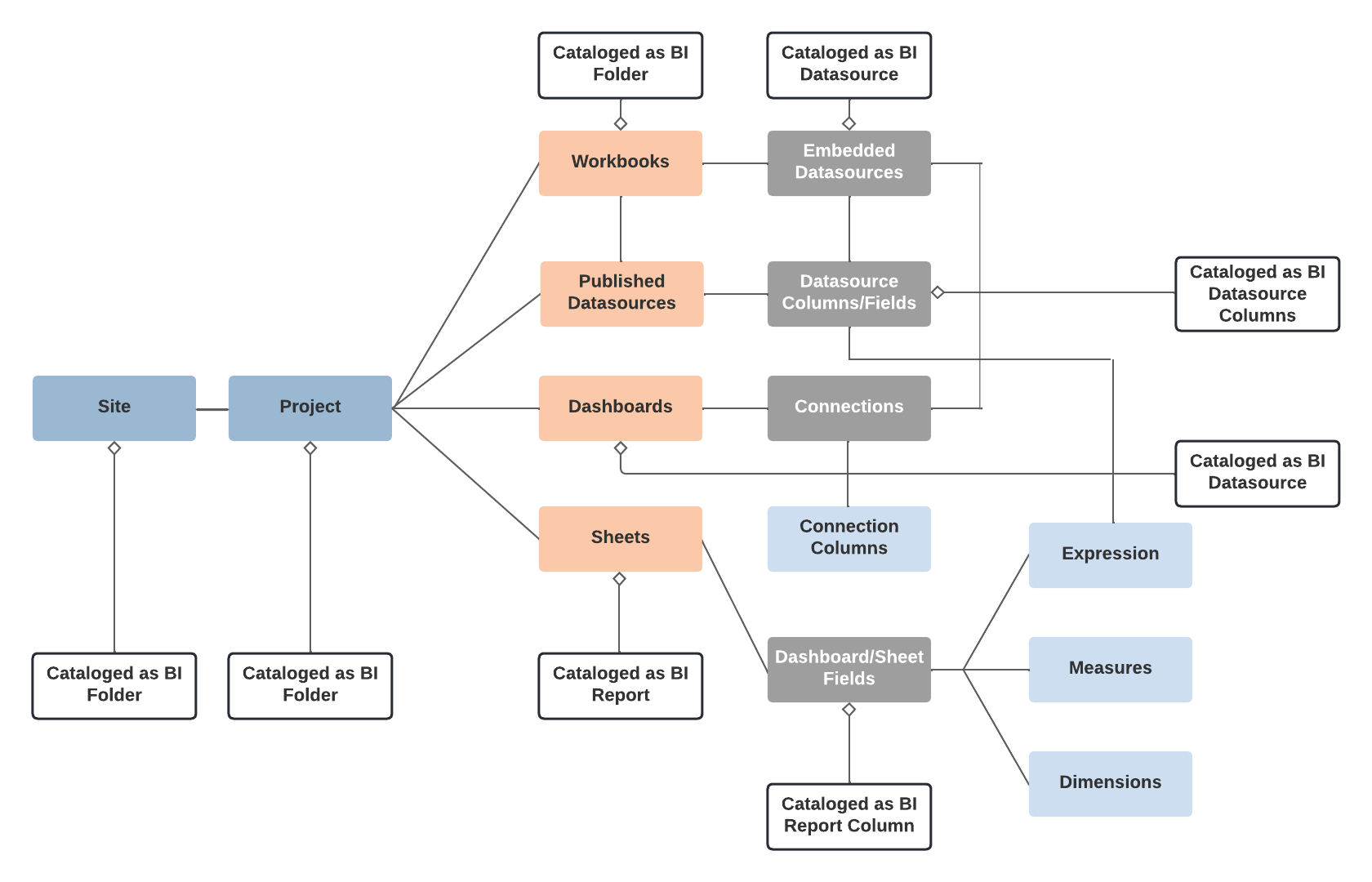Tableau OCF Connector: Overview¶
Alation Cloud Service Applies to Alation Cloud Service instances of Alation
Customer Managed Applies to customer-managed instances of Alation
The OCF connector for Tableau was developed by Alation and is available as a Zip file that can be uploaded and installed in the Alation application.
To download the Tableau OCF connector package, go to the Alation Connector Hub available from the Customer Portal. Go to Customer Portal > Connectors > Alation Connector Hub. Only Alation users with access to the Customer Portal can access the Alation Connector Hub. If you don’t have access to the Customer Portal, contact Alation Support.
This connector should be used to catalog Tableau Server or Tableau Cloud as a BI source in Alation. It extracts Tableau objects such as sites, projects, workbooks, views (worksheets, dashboards), fields, data sources, data source fields, and connection information such as table, query, db type, hostname, port and more that are used by Tabelau datasources. After the metadata is extracted, it is represented in the data catalog as a hierarchy of catalog pages under the parent data source. Alation users can leverage the full catalog functionality to search for and find the extracted metadata, curate the corresponding catalog pages, create documentation about the data source, and exchange information about it.
Note
For Alation Cloud Service customers, Alation offers additional capabilities with the Tableau OCF connector. See Alation Anywhere for Tableau for more details.
Team¶
The following administrators are required to install this connector:
Alation Server Admin
Installs the connector
Creates a Tableau BI source
Provisions Alation API tokens
Tableau user with the site administrator role
On Tableau Server, enables the Metadata API
Note
On Tableau Online, this API is enabled by default.
Provides host and authentication information
Scope¶
The table below shows what features are covered by the connector. For version support information, refer to the support matrix for your specific release: Support Matrices.
Feature |
Description |
Tableau Server |
Tableau Online |
|---|---|---|---|
Authentication |
|||
Basic authentication |
Authentication to Tableau using a service account (username and password) |
|
|
SSL |
Authentication using the SSL protocol |
|
|
Personal access token |
Authentication with a personal access token |
|
|
Active Directory |
Authentication with Active Directory as the identity store |
|
|
LDAP, MFA, SAML |
LDAP, MFA, or SAML authentication |
|
|
Extracted metadata objects |
|||
Sites |
Catalog sites |
|
|
Site filtering |
Ability to include or exclude specific sites |
|
|
Projects |
Catalog projects in a site |
|
|
Project filtering |
Ability to include or exclude specific projects |
|
|
Workbooks |
Catalog workbooks |
|
|
Dashboards and reports |
Catalog reports (views)—sheets and dashboards |
|
|
Tableau stories and flows |
Ability to catalog tableau stories and flows |
|
|
Report filtering |
Ability to include or exclude specific reports |
|
|
Report columns |
Catalog dimensions, measures, and measure expressions |
|
|
Report owner |
Owner or author who created the report |
|
|
Data sources or Published data sources |
Catalog published data sources used in reports |
|
|
Embedded Data sources or Unpublished data sources |
Catalog unpublished or embedded data sources used in reports |
|
|
Data source columns |
Catalog data source columns (fields) |
|
|
Databases and tables |
Extract information about databases and tables used as data sources |
|
|
Users |
Extracts users that have the same username in Tableau as they do in Alation |
|
|
Permissions |
Extract read permissions information for Tableau objects |
|
|
Applications |
Catalog applications |
|
|
Dataflows |
Catalog dataflows |
|
|
Datasets |
Catalog datasets |
|
|
Source comments |
Catalog source comments (descriptions)—available from Alation version 2022.3 Source comments are supported for projects, workbooks, published data sources, report columns, and data source columns |
|
|
Owner |
Owner or author who created a workbook, view, data source, or project. The Owner value is extracted from connector version 1.5.0. Note Project owner value is extracted from connector version 1.6.1 |
|
|
Alation catalog features |
|||
Metadata extraction |
Ability to extract the metadata |
|
|
Extract image previews |
Ability to show a thumbnail image of workbooks and reports |
|
|
Report lineage |
Ability to auto-generate lineage for reports. Alation Version 2023.1.1 and connector version 1.4.0 or newer supports column-level lineage. |
|
|
Report popularity |
Display the popularity value for extracted report objects |
|
|
Workbook popularity |
Display the popularity value for extracted workbooks |
|
|
Security replication |
Replicate access control to reports and dashboards (permission mirroring) |
|
|
Multi-domain user extraction |
Extract permission information for users in different domains |
|
|
Tableau Object Mapping¶
The following diagram shows how extracted Tableau objects map onto Alation objects:

